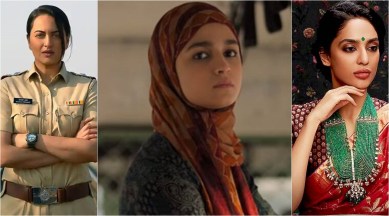Click here to follow Screen Digital on YouTube and stay updated with the latest from the world of cinema.

As I watched Reema Kagti and Zoya Akhtar’s latest web series Dahaad (co-produced by Excel Entertainment, co-directed by Ruchika Oberoi) I couldn’t help but feel a sense of Deja vu for their wonderful film Talaash, which was released over a decade ago. Dahaad tells the story of a police investigation into 27 missing women, all of whom were found dead under the same suspicious circumstances. Yet, for over a decade, no one has bothered to investigate even one of these incidents. It reminded me instantly of Kareena’s dialogue in Talaash where she tells Aamir Khan, “Ajeeb baat hain na sahab, ek ladki gayab ho jati hain, aur sala kisiko farak hi nahin padta (Isn’t it strange sir, a girl vanishes and no one gives a damn).”
So, what differentiates Zoya Akhtar and Reema Kagti from their colleagues in the industry? Over the years Reema and Zoya, who now have their own production house Tiger Baby Films, have built a reputation of being associated with stories that are well researched and exceptionally written. Secondly, they are committed to creating onscreen characters for women that reflect the diversity of what it means to be an Indian woman. Thirdly and most importantly, they reject Bollywood’s tendency to pass judgement on a woman’s character and choices. As storytellers, their only focus is on finding the truth of the character and drawing our attention to a larger web of issues.
In their latest offering, Dahaad, Anand (Vijay Verma) is a psychopath who finds, grooms and then murders women who are scraping the bottom of the demographic and socio-economic barrel. All his victims are women in their late twenties or early thirties, unmarried, and from poor families who can’t afford any dowry. When these girls elope with Anand in the hope of getting married, their families seldom report them missing. The shame of having a runaway daughter is quickly replaced by the relief of having escaped the burden of dowry.
Reema and Zoya paint a heart-breaking portrait of how patriarchy, poverty and the politics of caste collectively enable a man like Anand to prey on the women that he targets. He may be the killer, but his crimes are abetted by an inherently unjust society. Sonakshi Sinha as the protagonist Anjali is the only female police officer at her police station. The repeated insults over her caste and having to prove her worth in a male-dominated work environment forces her to project a tough exterior. But at no point is she trying to be a man, physically or through her behaviour. Though she brings her lived experience as a lower caste woman to solve the case, her gender never has an impact on her capability and commitment as a cop.
Dahaad is not the first time that Reema and Zoya have created characters for women that broke the mould without screaming from the rooftops about it. Katrina’s free-spirited scuba diving instructor Laila (in the otherwise testosterone laden ZNMD), was not trying to prove a point or be a bubbly girl. She was a woman with depth and courage who had chosen to live life according to a certain philosophy. In Gully Boy, Alia’s character was not the protagonist of the story, but she had an arc that echoed Murad’s journey of breaking free and finding oneself. For Alia’s Safina, freedom meant wearing lipstick and attending a concert, and she fights for the right to live life on her own terms, however simple that victory may seem.
Even with a character like Tara Khanna (Sobhita Dhulipala) in the series Made in Heaven, they don’t justify or defend her actions. Tara’s desperation to be wealthy is reflective of an entire suppressed economic class looking to improve their lives through education and soft skills. This empathy and understanding are extended to almost all the female characters on the show. From the young girl who chooses to remain married to an impotent man because he is her ticket to live abroad, the intern who misuses a credit card, to Kalki’s character Faiza who has an affair with Tara’s husband; each woman’s experience is treated with dignity.
What is especially creditable, is that even the women who do not share their progressive thinking, are treated with understanding. Shefali Shah as Neelam in Dil Dhadakne Do is narrow-minded and manipulative, but that doesn’t safeguard her from heartbreak, loneliness and emotional eating. Sheeba Chaddha in Gully Boy as Alia’s mother or Gulshan Deviah’s wife in Dahaad are never ridiculed or criticised for not challenging the norms. Instead, we reach the crushing realisation that they are victims too, conditioned by society to conform and keep their heads down.
For far too long characters for women were slotted into the trinity of heroine, vamp, and mom or other family members. But with each film or web series that they work on, Reema Kagti, Zoya Akhtar and their team of actors, writers, and directors are telling us that we can not only think outside the box but should do away with the box altogether. Here’s hoping their Tiger Baby continues to Dahaad (roar) and tell us untold stories of women.
Click here to follow Screen Digital on YouTube and stay updated with the latest from the world of cinema.